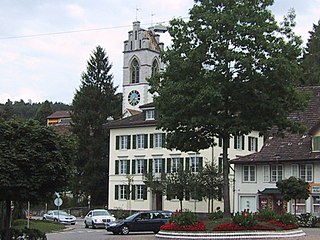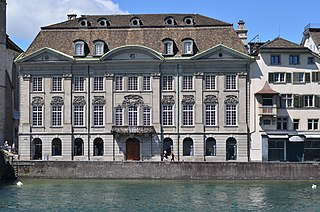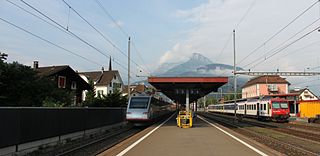
The canton of Zurich is an administrative unit (canton) of Switzerland, situated in the northeastern part of the country. With a population of 1,553,423, it is the most populous canton of Switzerland. Zurich is the de facto capital of the canton, but is not specifically mentioned in the constitution. The official language is German. The local Swiss German dialect, called Züritüütsch, is commonly spoken.

Herzog & de Meuron Basel Ltd. is a Swiss architecture firm headquartered in Basel (Switzerland), founded by Jacques Herzog and Pierre de Meuron.

Zürich Stadelhofen railway station is an important local railway station in the city of Zürich, on the Zürich-Rapperswil, Zürich-Winterthur, Zürich-Uster lines of the SBB CFF FFS. An adjacent station, Zürich Stadelhofen FB, is the terminus of the Forchbahn (FB) suburban railway and is served by several lines of the Zürich tram network.

Kappel am Albis is a municipality in the district of Affoltern in the canton of Zürich in Switzerland.

The Swiss National Library is the national library of Switzerland. Part of the Federal Office of Culture, it is charged with collecting, cataloging and conserving information in all fields, disciplines, and media connected with Switzerland, as well as ensuring the widest possible accessibility and dissemination of such data.

Affoltern am Albis is a town and a municipality in the district of Affoltern in the canton of Zürich in Switzerland.

Mettmenstetten is a village in the district of Affoltern in the canton of Zürich in Switzerland.

Wettswil am Albis is a municipality in the district of Affoltern in the canton of Zürich in Switzerland.
The Society for Art History in Switzerland is a Swiss learned society dedicated to promoting the understanding of Swiss art history and particularly of Swiss topography of art, including the study and maintenance of Swiss cultural heritage sites. The society, founded in 1880, publishes a wide range of monographs, guides, and inventories. These include the series Art monuments of Switzerland, which includes more than one hundred volumes, the first of which was published in 1927. It also publishes the quarterly journal Kunst und Architektur in der Schweiz.

The Zunfthaus zur Meisen is the guild house of the Zunft zur Meisen. It is one of the many historically valuable buildings in the Lindenhof quarter in Zürich, Switzerland, and also housed the porcelain and faience collection of the Swiss National Museum by April 2018. It is situated at the Münsterhof and the Münsterbrücke, a bridge over the river Limmat, opposite the upper Limmatquai with the Constaffel, Zimmerleuten, Kämbel and Saffran guild houses.

Rapperswil is a former municipality and since January 2007 part of the municipality of Rapperswil-Jona in the Wahlkreis (constituency) of See-Gaster in the canton of St. Gallen in Switzerland, located between Obersee and the main part of Lake Zurich.

Käferberg and Waidberg are the summits of a wooded range of hills overlooking the inner city of Zürich, Zürichsee, Albis chain and Uetliberg, as well as the Limmat Valley and the Zürcher Unterland in Switzerland.

Brunnen railway station is a railway station serving the resort of Brunnen, in the Swiss canton of Schwyz and municipality of Ingenbohl. It is located on the Gotthard railway, and is served by long-distance trains as well as by commuter and suburban trains.

Zug railway station serves the municipality of Zug, the capital city of the canton of Zug, Switzerland.

Uster is a railway station in Switzerland, situated in the city of Uster. The station is located on the Wallisellen to Uster and Rapperswil railway line.

Affoltern am Albis is a railway station in the Swiss canton of Zürich, situated in the municipality of Affoltern am Albis. The station is located on the Zürich to Zug via Affoltern am Albis railway line. Affoltern am Albis station is less than 30 minutes from Zürich Hauptbahnhof.

Aathal is a railway station in the Swiss canton of Zürich and municipality of Seegräben. It is on the Wallisellen to Rapperswil via Uster line.

The S5 is a regional railway service of the S-Bahn Zürich on the Zürcher Verkehrsverbund (ZVV), Zürich transportation network. The S5 is one of the network's services connecting the cantons of Zürich, St. Gallen, Schwyz and Zug.

The Federal Department of Home Affairs is a department of the federal administration of Switzerland and serves as the Swiss ministry of the interior. Since 2024, it is headed by Federal Councillor Élisabeth Baume-Schneider.
Christian Georg Kerez is a Swiss architect, architectural photographer and professor.


















